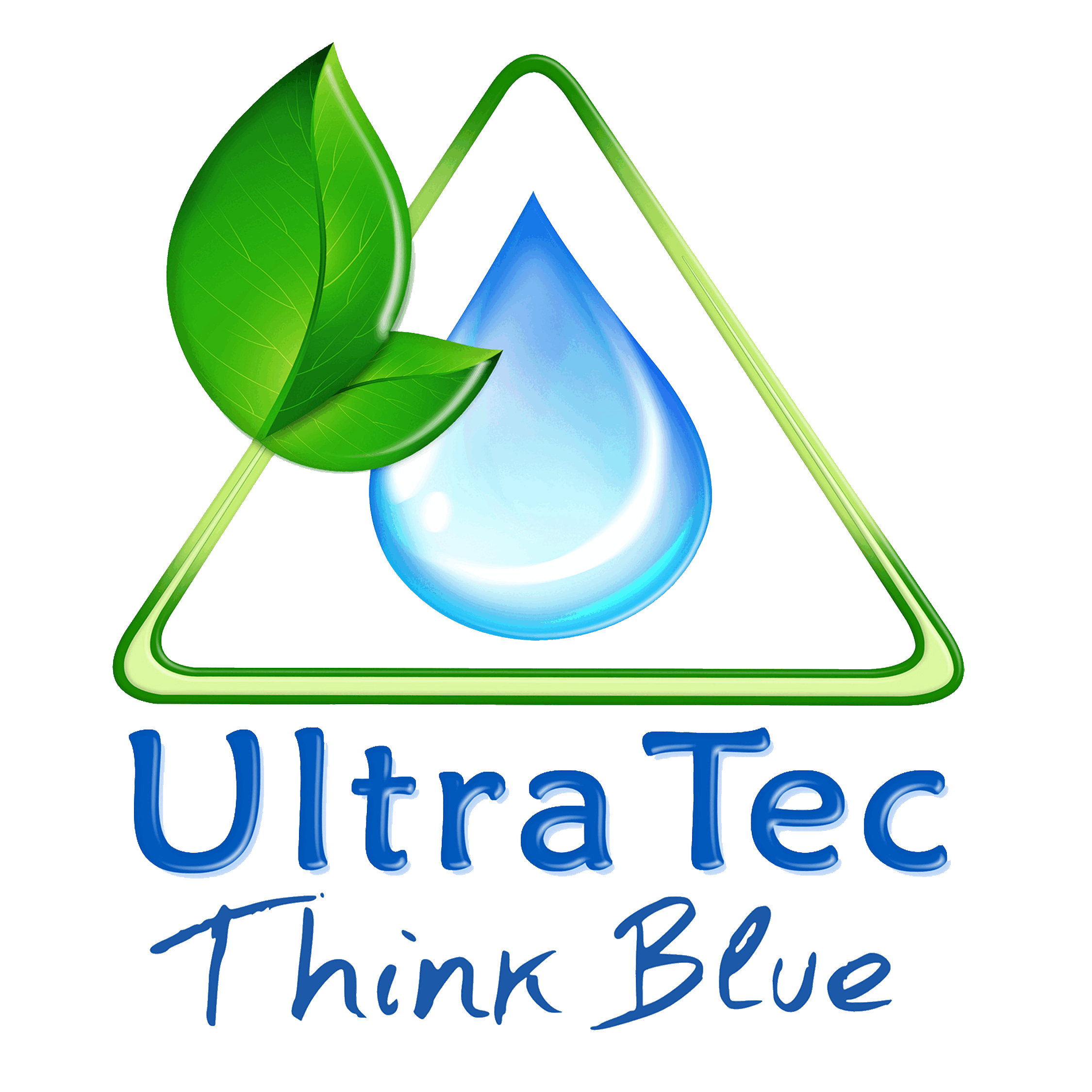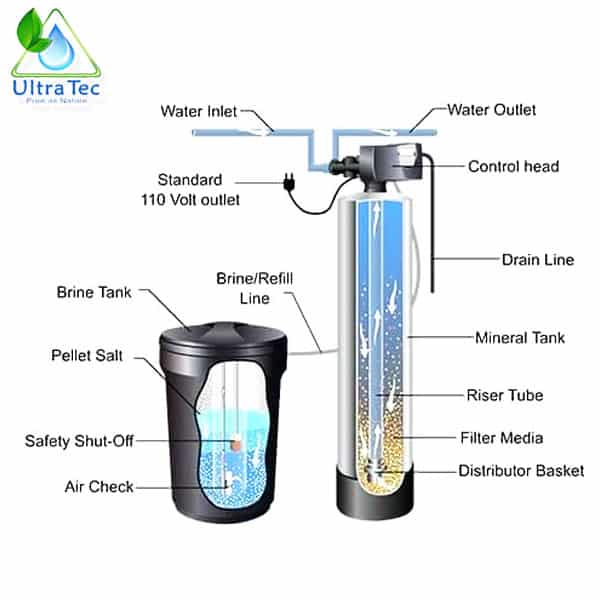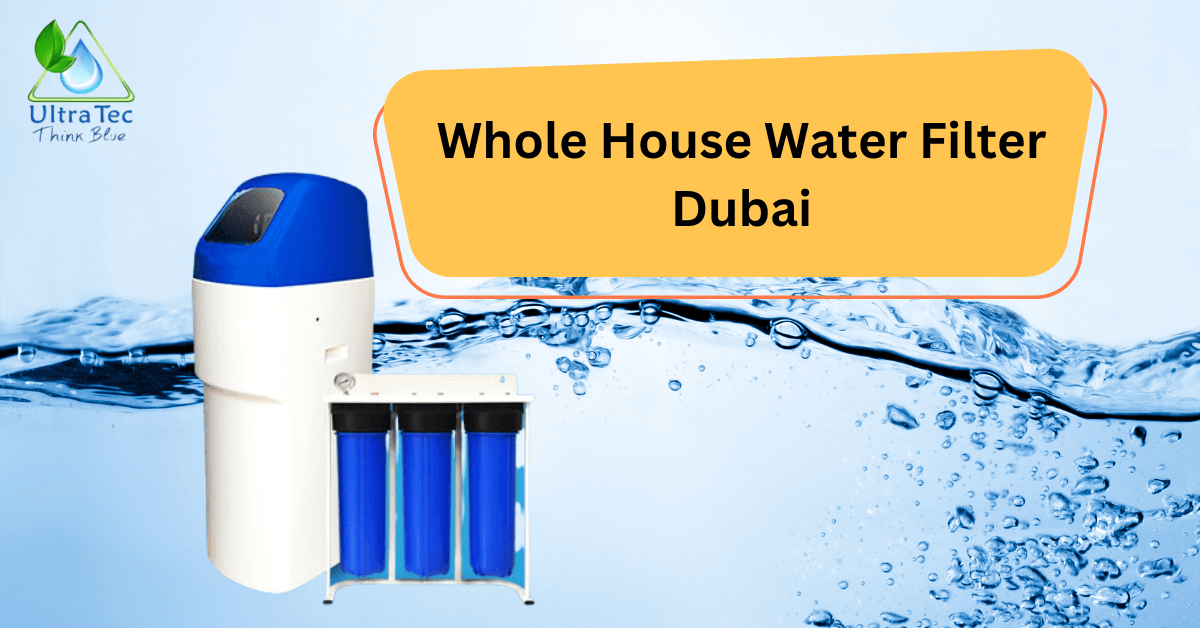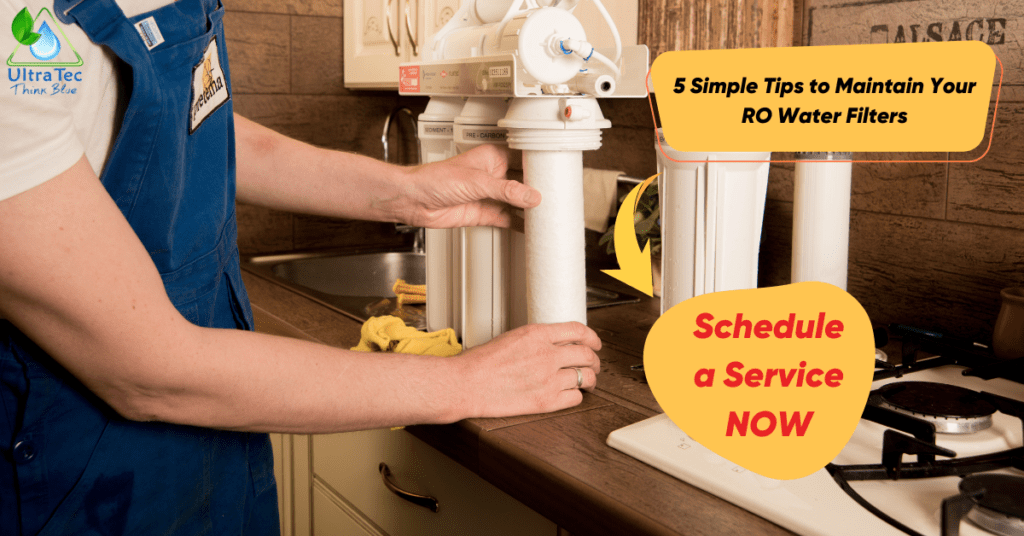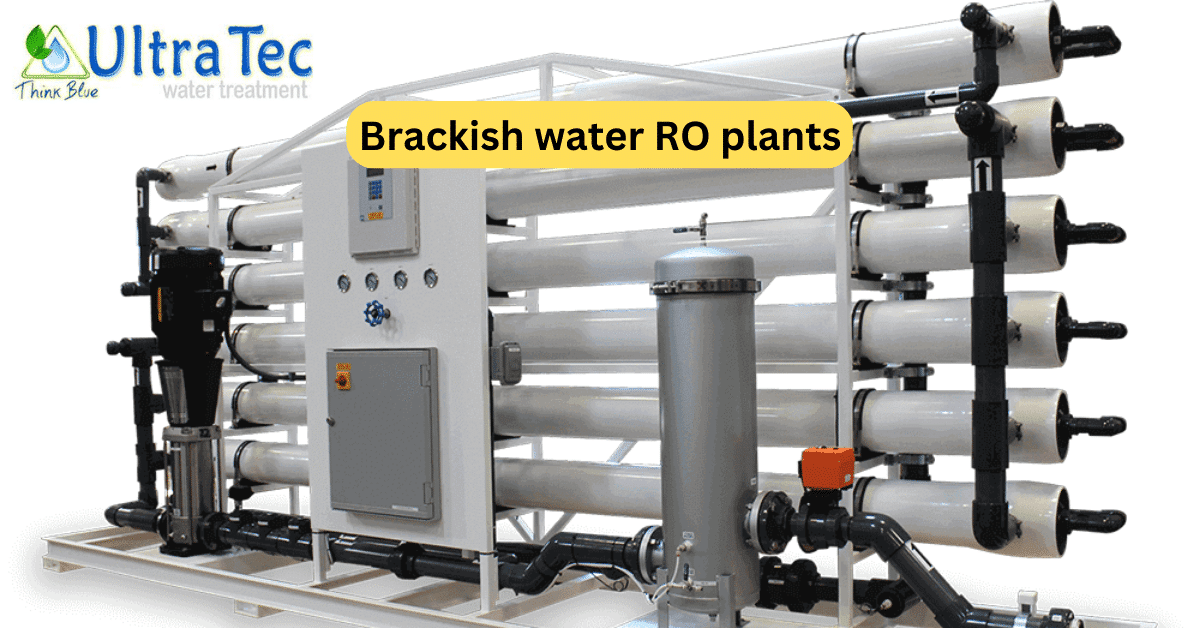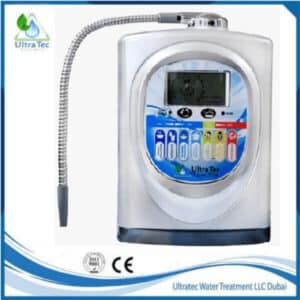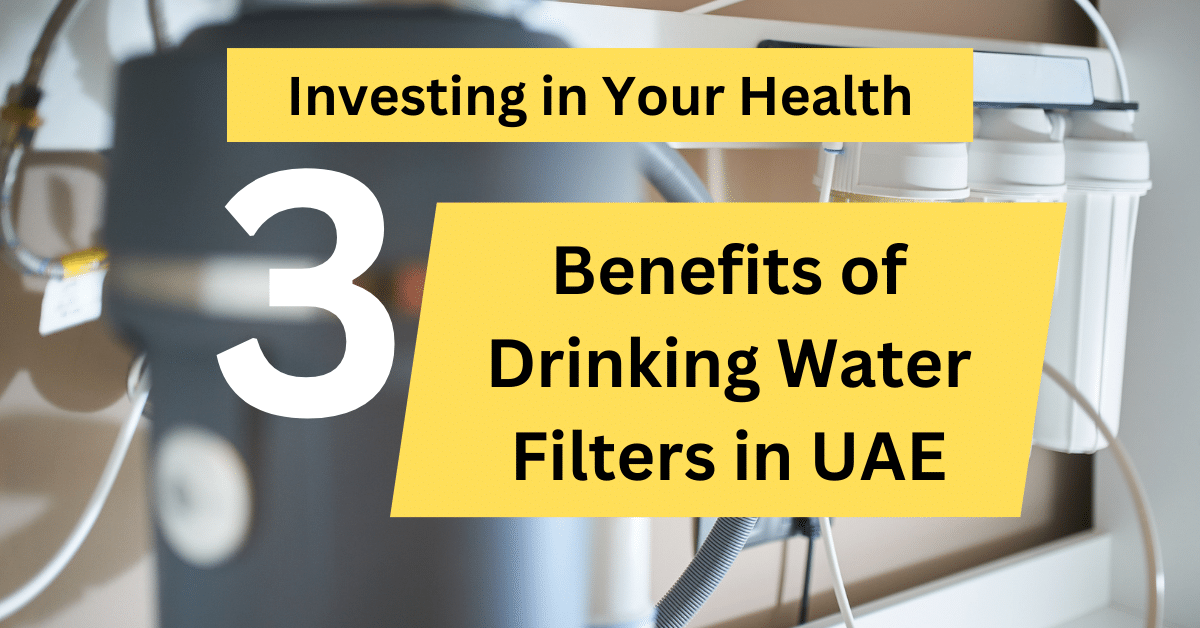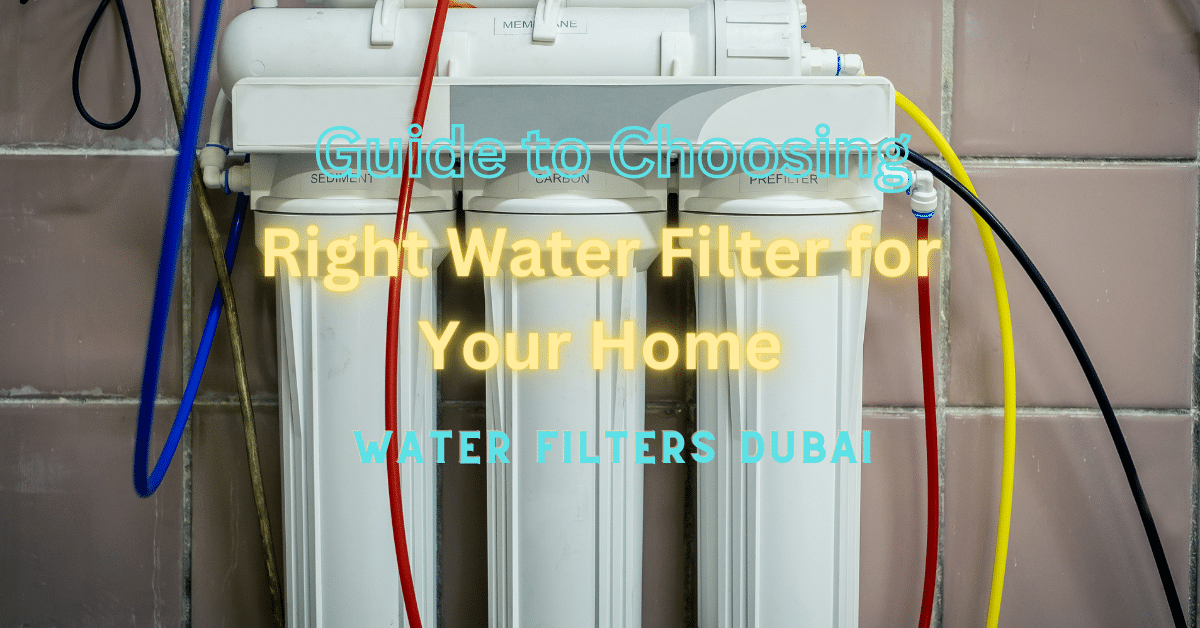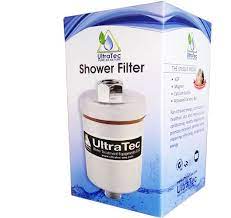Category: Filters
How a Water Softener Can Transform Your Home’s Water Quality
Do you notice a white buildup on your faucets and showerheads, or do your dishes look spotty and streaky no matter how often you wash them? If so, you might be dealing with hard water. Hard water is a common issue that affects many households, but luckily, there’s an easy solution: a water softener.
A water softener is a device that removes minerals like calcium and magnesium from your water supply, preventing hard water buildup and improving water quality. This article will examine how a water softener can benefit your home and answer frequently asked questions about this helpful appliance.
How Water Softeners Work
Water softeners are appliances designed to remove hard water minerals from your water supply. They use an ion exchange process involving swapping calcium and magnesium ions for sodium ions.
The water softener consists of a tank filled with resin beads coated with sodium ions as hard water flows through the tank, the calcium and magnesium ions in the water stick to the resin beads, while the sodium ions are released into the water.
This process effectively “softens” the water, removing the minerals that cause hard water. Once the resin beads become coated with calcium and magnesium ions, they need to be cleaned in a process called regeneration.
A salt solution is added to the tank during regeneration, replacing the calcium and magnesium ions on the resin beads with sodium ions. The calcium and magnesium ions are flushed out of the tank and down the drain.
Benefits of Using a Water Softener
Using a water softener in your home can provide many benefits, including:
- Improving Water Quality: Hard water can leave your skin feeling dry and itchy, cause buildup on your fixtures, and leave your dishes looking dirty. By removing the minerals that cause hard water, a water softener can provide cleaner water for your skin, hair, and clothes.
- Saving Money: Hard water can cause damage to your appliances and plumbing over time, leading to costly repairs or replacements. Using a water softener, you can extend the lifespan of your appliances and plumbing and avoid expensive repairs.
- Reducing Soap and Detergent Usage: Hard water can make it challenging to create suds, meaning you need to use more soap and detergent to clean your clothes and dishes. With a water softener, you’ll use less soap and detergent, saving you money in the long run.
- Making cleaning Easier: Without hard water buildup, cleaning your fixtures, countertops, and other surfaces becomes more accessible and less time-consuming.
- Softer skin and hair: Hard water can be tough on your skin and hair, leaving them dry and brittle. Soft water is gentler, leaving your skin and hair soft and silky.
- Cleaner clothes and dishes: Hard water can cause buildup on your clothes and dishes, making them look dingy and dull. Soft water, on the other hand, can help keep your clothes and dishes looking clean and bright.
- Longer lifespan for appliances: Hard water can cause mineral buildup in your appliances, shortening their lifespan. Water softeners can help prevent this buildup, allowing your appliances to last longer.
Installation Process of water softener
Installing a water softener can be a complex process, and it’s generally recommended that you hire a professional to do it for you. However, if you’re handy with plumbing and have some experience with home improvement projects, you can tackle the job yourself.
Here are the basic steps involved in installing a water softener:
- Choose a location: You’ll need to choose a location for your water softener close to your water supply and has access to a drain.
- Shut off the water supply: Turn off the main water supply to your home to prevent water from flowing while installing the water softener.
- Install a bypass valve: You must install one to allow water to flow around the softener during regeneration.
- Install the water softener: Install the water softener in your chosen location, following the manufacturer’s instructions.
- Connect the water supply: Connect the water supply to the water softener according to the manufacturer’s instructions.
- Connect the drain: Connect the drain line to the water softener and run it to a nearby drain.
- Add salt to the water softener tank, following the manufacturer’s instructions.
- Test the water: Once the installation is complete, turn on the water supply and test the water to make sure it’s soft.
If you need more time to install a water softener yourself, it’s best to hire a professional to do it for you. They’ll be able to ensure that the installation is done correctly, and they’ll be able to answer any questions you may have.
FAQs
Q: Do water softeners require maintenance?
A: Yes, water softeners do require some maintenance. You’ll need to add salt to the tank regularly, and you’ll also need to clean the resin beads periodically.
Q: Will a water softener remove all minerals from my water?
A: No, a water softener will only remove the minerals that cause hard water, like calcium and magnesium. It won’t remove other minerals or impurities from your water.
Q: How long will a water softener last?
A: A well-maintained water softener lasts 10-15 years or more.
Q: Can I drink softened water?
A: Yes, you can drink softened water. However, some people prefer a separate tap for drinking water that bypasses the water softener.
Whole House Water Filter Dubai: Ensuring Safe and Pure Water for Your Home
Access to clean and safe water is vital for maintaining good Health. However, tap water can harbour a range of impurities, including harmful chemicals and other substances that may harm your well-being. Installing a whole-house water filter in Dubai is one efficient way to guarantee that your family can access clean and pure water throughout your home. This article will delve into the advantages of whole-house water filters and why it is a wise investment for you and your family in Dubai.
The Importance of Clean Water Clean water access is crucial for maintaining good Health. Unfortunately, impurities such as bacteria, viruses, heavy metals, and chemicals in tap water can harm your Health. Although some impurities may be present in small amounts, continuous exposure may lead to health complications.
Why Choose a Whole House Water Filter?
A whole house water filter is a practical solution to eliminate impurities from your tap water. Unlike point-of-use filters that treat water at a single location (such as the kitchen sink), whole house filters treat all the water that enters your home. As a result, all taps and showers in your house will deliver clean, safe water.
How Do Whole House Water Filters Work?
- Various technologies are used to eliminate impurities from water in whole house water filters. Activated carbon filters, reverse osmosis filters, and UV filters are among the most common types of filters.
- Activated carbon filters use activated carbon to absorb impurities from water. This type of filter is effective at removing chlorine, pesticides, and other organic compounds.
- Reverse osmosis filters use a semi-permeable membrane to remove impurities from water. This filter type effectively removes dissolved solids such as heavy metals and minerals.
- UV filters use ultraviolet light to eliminate bacteria and viruses in water. This type of filter is effective at removing harmful microorganisms from water.
Benefits of Whole House Water Filters Investing in a whole house water filter in Dubai offers many benefits. Some of the most significant benefits include the following:
- Improved Health By eliminating impurities from your tap water, a whole house water filter can help to improve your Health. You will be less susceptible to health problems related to water contamination, such as gastrointestinal illness or skin irritation.
- Better-Tasting Water Many impurities present in tap water can affect its taste. A whole house water filter can help enhance your water’s flavour, making it more enjoyable to drink.
- Appliance Protection Impurities in tap water can damage your appliances over time. A whole house water filter can help to protect your appliances from damage caused by hard water or other impurities.
- Cost Savings Investing in a whole house water filter can also help you save money over time. You will no longer need to purchase bottled water or point-of-use filters, which can be expensive.
Choosing a Whole House Water Filter in Dubai When choosing a whole house water filter for your home in Dubai, several factors require consideration. These include the size of your home, the level of water contamination, and your budget. Choosing a reputable brand and ensuring that the filter is certified by a recognized testing organization, such as NSF International, is also crucial.
Conclusion Investing in a whole house water filter is an effective way of guaranteeing that you and your family have access to clean, safe, and pure water throughout your home. By eliminating impurities from your tap water, you will be safeguarding your family’s Health and well-being.
At our store, you will find a wide range of filters with the added convenience of home delivery and installation. Our products are reliable and come with a 100% satisfaction guarantee. Waterfiltersdubai a subsidiary of Ultra Tec based in Dubai, UAE, offers these services.
Use These 5 Simple Tips to Maintain Your RO Water Filters
Reverse Osmosis (RO) water filters are essential for any household that needs clean and safe drinking water. They help remove impurities, contaminants, and bacteria from the water, ensuring pure, healthy drinking water. However, like any other household appliance, RO water filters require maintenance and care to work efficiently and last longer. In this article, we’ll discuss 5 simple tips to maintain your RO water filters.
Replace the Filters Regularly:
RO water filters have different stages of filtration, and each stage has a filter that needs to be replaced at a specific time interval. The pre-filter needs to be replaced every 6 to 12 months, the post-filter every 12 months, and the RO membrane every 24 months. Regularly replacing the filters ensures that the filtration process is efficient and effective and the water quality remains optimal.
Clean the Filters and Membrane:
Over time, the filters and RO membrane can get clogged with impurities, affecting the water flow and quality. It is essential to clean the filters and membrane regularly to prevent clogging and ensure optimum performance. You can clean the filters by soaking them in a solution of water and vinegar for about 30 minutes and then rinsing them thoroughly. The RO membrane can be cleaned with a resolution of water and bleach, followed by a thorough rinse.
Monitor Water Pressure:
The water pressure in your home can affect the performance of your RO water filter. If the water pressure is too low or too high, it can cause the filter to malfunction or reduce the filtration efficiency. Monitoring the water pressure and ensuring it falls within the recommended range of 40 to 80 psi is essential. You can use a water pressure gauge to measure and adjust the pressure accordingly.
Check for Leaks:
Leaks in your RO water filter can cause water wastage and reduce the efficiency of the filtration process. It is essential to check for leaks regularly and fix them promptly. Check the filter housing, fittings, and connections for any signs of leaks, such as water puddles or dampness. Tighten any loose connections or replace any damaged parts to prevent leaks.
Use High-Quality Filters and Membrane:
Using high-quality filters and membranes can significantly improve the performance and longevity of your RO water filter. Low-quality filters can clog faster, require frequent replacement, and compromise the water quality. Using filters and membranes from reputable brands and suppliers is recommended to avoid cheap, inferior-quality products.
Why Maintenance is Important:
Keeping your water filters and RO plants in proper working condition is crucial to guarantee clean and safe drinking water. With regular maintenance, you can increase the lifespan of your filters and RO plants and avoid costly repairs or replacements. Our annual maintenance services will keep your water filters and RO plants working efficiently and effectively.
What We Offer:
Our company offers comprehensive annual maintenance services for your water filters and RO plants. Our team of experts will perform a thorough inspection and cleaning of your filters and RO plants to ensure they are working correctly and efficiently. We will also check for any leaks, clogs, or other potential issues and repair them as needed.
Our Services Include:
- Inspection of filters and RO plants
- Cleaning of filters and RO plants
- Checking for leaks and clogs
- Repairing any potential issues
- Testing the water quality
- Providing recommendations for future maintenance
Benefits of Our Services:
- Keeps your water filters and RO plants working efficiently
- Increases the lifespan of your filters and RO plants
- Avoids costly repairs or replacements
- Ensures clean and safe drinking water
- Provides peace of mind with regular maintenance
How to Schedule a Service:
Scheduling service with us is easy and convenient. Contact us today, our representatives will be in touch with you shortly to schedule your appointment. We offer flexible scheduling options to accommodate your schedule, and our team will arrive on time and ready to perform the maintenance services.
We also provide contract maintenance and inspection services to ensure the long-term stability and reliability of the water treatment plant. Our expert staff members are available 24/7/365 to respond to customer requests and dispatch experienced field service engineers from our technical support hubs across the UAE.
Brackish Water RO Plant: A Complete Guide
Brackish water refers to water with a higher salinity than freshwater but lower than seawater. It contains dissolved salts and minerals that make it unsuitable for direct human consumption, irrigation, or industrial purposes. However, salty water can be treated to remove these impurities and converted into usable water through a brackish water reverse osmosis (RO) plant.
This blog will explore the basics of brackish water RO plants, their components, working principle, and benefits.
What is a Brackish Water RO Plant?
A brackish water RO plant is a water treatment system that uses reverse osmosis technology to remove impurities from salty water. The plant has several components that work together to purify the water and make it suitable for various applications. The RO process involves forcing the brackish water through a semi-permeable membrane that blocks impurities and separates pure water from the concentrated waste stream.
Components of a Brackish Water RO Plant:
A typical brackish water RO plant consists of the following components:
- Pre-Treatment System: This system includes a series of filters and chemical treatments that remove more significant impurities, such as sediment, bacteria, viruses, and organic matter before the water enters the RO membranes.
- High-Pressure Pump: This pump applies pressure to the brackish water to force it through the RO membranes.
- Reverse Osmosis Membranes: These semi-permeable membranes act as a barrier that blocks impurities and allows only pure water to pass through. The membranes are made of thin films of synthetic materials with microscopic pores that can trap ions and molecules.
- Post-Treatment System: This system includes additional filters and chemical treatments that remove any remaining impurities, adjust the pH level, and disinfect the water before it enters the distribution system.
Types of Brackish Water RO Plant:
Brackish Water RO Plant 20000GPD:
A 20000GPD brackish water RO plant can produce up to 20,000 gallons of purified water per day. This size is suitable for small to medium-sized industries, such as food and beverage, pharmaceuticals, and hospitality.
Brackish Water RO Plant 30000GPD:
A 30000GPD brackish water RO plant can produce up to 30,000 gallons of purified water per day. This size is suitable for more prominent industries, such as power plants, mining, and oil and gas, requiring more clean water for their operations.
Working Principle of a Brackish Water RO Plant:
The brackish water RO plant works on reverse osmosis, which involves the movement of water molecules from a high-concentration solution to a low-concentration solution through a semi-permeable membrane. The brackish water is pressurized and passed through the RO membranes in the RO process. The membranes have microscopic pores that allow only pure water molecules to pass through while blocking impurities, such as dissolved salts, minerals, and contaminants. The impurities are collected in a concentrated waste stream, also known as brine, which is discharged from the system. The pure water is collected and sent to the post-treatment system for further purification before distribution.
Benefits of a Brackish Water RO Plant:
- Provides Safe Drinking Water: A brackish water RO plant can provide safe drinking water by removing impurities, such as dissolved salts, minerals, and contaminants, that can cause health issues.
- Reduces Water Scarcity: Brackish water RO plants can convert brackish water into usable water, which can help reduce water scarcity in areas with limited freshwater resources.
- Saves Money: Brackish water RO plants can help save money by reducing the need for importing freshwater or treating seawater, which can be costly.
- Lowers Environmental Impact: Brackish water RO plants can lower the environmental impact by reducing the amount of energy and chemicals used in the water treatment process.
Conclusion:
Brackish water RO plants are an effective solution for treating brackish water and converting it into usable water. They consist of several components that work together to remove impurities and produce pure water. Brackish water RO plants provide safe drinking water, reduce water scarcity, save money, and reduce environmental impact. As the demand for clean water continues.
At our store, you will find a wide range of filters with the added convenience of home delivery and installation. Our products are reliable and come with a 100% satisfaction guarantee. Waterfiltersdubai a subsidiary of Ultra Tec based in Dubai, UAE, offers these services.
All You Need to Know About Swimming Pool Chlorination System
Swimming is one of the most popular and refreshing activities, especially during the summer season. If you own a swimming pool, you are already aware of the joy and relaxation it can bring. However, owning a swimming pool comes with a significant responsibility of maintaining its hygiene and safety for swimmers. One of the essential components of swimming pool maintenance is chlorination. In this blog, we will explore the swimming pool chlorination system, its importance, and how it works.
What is a Swimming Pool Chlorination System?
Swimming pool chlorination system refers to the process of adding chlorine to the pool water to disinfect it from harmful bacteria, viruses, and other contaminants. Chlorine is a powerful disinfectant that kills germs and prevents the growth of algae and other microorganisms in the pool. There are several types of pool chlorination systems available, including saltwater chlorination, traditional chlorine-based systems, and UV-based systems.
How does a Swimming Pool Chlorination System Work?
A swimming pool chlorination system works by adding chlorine to the pool water through a chemical feeder or by pouring it directly into the pool. Chlorine dissolves in the water and creates hypochlorous acid, which is a potent disinfectant. The hypochlorous acid kills bacteria, viruses, and other harmful contaminants in the pool water, making it safe for swimming.
Types of Swimming Pool Chlorination Systems:
There are several types of swimming pool chlorination systems available in the market. Let’s take a look at some of the most common types.
- Saltwater Chlorination System: A saltwater chlorination system uses salt to generate chlorine through electrolysis. The system is easy to use, cost-effective, and requires minimal maintenance.
- Traditional Chlorine-Based System: A traditional chlorine-based system is the most common type of pool chlorination system. It involves adding chlorine tablets or granules directly to the pool water through a chemical feeder.
- UV-Based System: A UV-based system uses ultraviolet light to kill bacteria and other contaminants in the pool water. The system is effective, eco-friendly, and requires minimal maintenance.
Benefits of Using a Swimming Pool Chlorination System
Using a swimming pool chlorination system offers several benefits, including:
- Keeps the pool water clean and safe for swimming
- Prevents the growth of algae and other microorganisms in the pool
- Reduces the risk of waterborne illnesses and infections
- Extends the life of pool equipment and reduces maintenance costs
- Provides a comfortable swimming experience for swimmers
How to Choose the Right Swimming Pool Chlorination System
Choosing the right swimming pool chlorination system depends on several factors, including the size of the pool, the type of pool, and personal preferences. Some factors to consider when choosing a chlorination system include:
- Type of pool: Different types of pools require different types of chlorination systems. For example, a saltwater chlorination system is suitable for a fiberglass pool, while a traditional chlorine-based system is suitable for a concrete pool.
- Budget: The cost of a chlorination system can vary depending on the type and brand. Consider your budget and choose a system that meets your requirements.
- Maintenance: Some chlorination systems require regular maintenance, while others are low-maintenance. Choose a system that fits your lifestyle and maintenance preferences
What is Reverse Osmosis and How It Solves Water Filter Problems in UAE
Reverse osmosis (RO) is a water filtration technology that removes dissolved minerals, impurities, and contaminants from water. In the UAE, where the water supply is often high in salinity and pollutants, reverse osmosis has become a popular solution to address water filter problems. In this article, we’ll dive deep into reverse osmosis, how it works, and why it’s an effective solution for water filtration in the UAE.
What is Reverse Osmosis?
Reverse osmosis is a water purification process involving removing impurities and contaminants from water by pushing it through a semi-permeable membrane under high pressure. The semi-permeable membrane used in RO filters out impurities and dissolved solids, leaving clean water behind. The process is called “reverse” osmosis because it involves the opposite of the natural osmosis process, which is the movement of water molecules from an area of low concentration to a place of high concentration. In reverse osmosis, the water is pushed from an area of high concentration to an area of low concentration.
How Does Reverse Osmosis Work?
Reverse osmosis uses a high-pressure pump to push water through a semi-permeable membrane. The membrane has tiny pores that are small enough to allow water molecules to pass through but large enough to filter out impurities and contaminants. As the water passes through the membrane, it leaves impurities such as salt, minerals, and other pollutants. The clean water is then collected and stored in a separate tank, ready for use.
Benefits of Reverse Osmosis:
There are many benefits to using reverse osmosis as a water filtration method, especially in the UAE. Here are some of the top benefits:
- Removes Impurities: Reverse osmosis removes impurities and contaminants such as salt, minerals, and other dissolved solids, leaving you with clean and pure water.
- Cost-Effective: Although the initial investment in a reverse osmosis system can be higher than other water filtration methods, the long-term cost savings are significant. Reverse osmosis systems require minimal maintenance and long lifespans, making them a cost-effective solution for clean water.
- Easy to Maintain: RO systems are easy to maintain and require minimal upkeep. Most RO systems only require the replacement of the semi-permeable membrane every 2-3 years.
- Improves Taste: Reverse osmosis removes impurities and contaminants that can give water an unpleasant taste or odour, improving water’s overall taste and quality.
- Environmentally Friendly: Reverse osmosis is an environmentally friendly water filtration method because it doesn’t use chemicals or produce waste. This makes it a sustainable and eco-friendly solution for clean water.
At our store, you will find a wide range of filters with the added convenience of home delivery and installation. Our products are reliable and come with a 100% satisfaction guarantee. Waterfiltersdubai a subsidiary of Ultra Tec based in Dubai, UAE, offers these services.
Frequently Asked Questions (FAQs):
What kind of impurities can reverse osmosis remove?
Reverse osmosis removes various impurities such as salt, minerals, bacteria, viruses, and other dissolved solids.
How often should I replace the semi-permeable membrane in my reverse osmosis system?
The semi-permeable membrane in a reverse osmosis system should be replaced every 2-3 years, depending on the quality of the water and the frequency of use.
Can reverse osmosis remove fluoride from water?
Yes, reverse osmosis can effectively remove fluoride from water.
Is reverse osmosis water safe to drink?
Yes, reverse osmosis water is safe to drink
The Benefits of Water Ionizer Machines: What You Need to Know
Water is essential for life, and ensuring that our water is clean and healthy is vital. One way to complete this is by using a water ionizer machine. In this blog, we’ll explore what water ionizer machines are, how they operate, and the benefits they offer.
What is a Water Ionizer Machine?
A water ionizer machine is a machine that filters and ionizes water, creating alkaline water with a higher pH level and antioxidant properties. The device uses an electrolysis process to separate the water into alkaline and acidic components, resulting in two types of water: alkaline water for drinking and acidic water for external use.
How to Do Water Ionizer Machines Work?
Water ionizer machines use an electrical charge to separate water into acidic and alkaline components. The device has a chamber containing a filter that removes impurities from the water. The filtered water then passes through an electrolysis chamber that separates the water into alkaline and acidic components. The alkaline water is collected in one container, while the acidic water is contained in another.
Water Ionizer in UAE:
Water ionizers are becoming increasingly popular in many countries because they provide alkaline water with numerous health benefits. In the United Arab Emirates (UAE), these machines are also gaining popularity as more people become aware of their potential benefits.
One of the leading advantages of utilizing a water ionizer in the UAE is the ability to improve the quality of tap water, which is often heavily treated with chemicals such as chlorine and fluoride. The ionization process used by these machines can remove impurities and help neutralize the acidic properties of tap water, resulting in cleaner and healthier water.
Benefits of Water Ionizer Machines:
- Improved Hydration: Alkaline water is more efficiently absorbed by the body to stay hydrated.
- Better Digestion: Alkaline water can help improve digestion by neutralizing stomach acid.
- Increased Energy: Drinking alkaline water can help boost your energy levels and reduce fatigue.
- Antioxidant Properties: Alkaline water includes antioxidant properties that can help save your body from damage caused by free radicals.
- Improved Skin Health: Acidic water can be used topically to help improve skin health by reducing inflammation and promoting healing.
- Environmental Benefits: Water ionizer machines help reduce the need for plastic water bottles, which can help reduce plastic waste.
Choosing the Right Water Ionizer Machine:
When choosing a water ionizer machine, consider the following factors:
- Water Filtration: Look for a machine with a high-quality filter to remove impurities and improve the taste of the water.
- Electrolysis Settings: Look for a machine with adjustable electrolysis settings to customize the water’s pH level.
- Ease of Use: Look for a comfortable device to operate and maintain.
Conclusion:
Water ionizer machines offer many benefits, including improved hydration, better digestion, increased energy, and antioxidant properties. When choosing a water ionizer machine, consider factors such as water filtration, electrolysis settings, and ease of use. Investing in a water ionizer machine allows you to enjoy clean, healthy water that can improve your overall health and well-being.
At our store, you will discover a wide range of filters with the added convenience of home delivery and installation. Our products are trustworthy and come with a 100% satisfaction guarantee. Waterfiltersdubai, a subsidiary of Ultra Tec based in Dubai, UAE, offers these services.
Investing in Your Health: The Benefits of Drinking Water Filters in UAE
Drinking water is essential for maintaining good health, but not all water sources are safe to drink. In the United Arab Emirates, there are increasing concerns about tap water quality, which has led many people to turn to water filters to ensure they are drinking clean and safe water.
Clean drinking water helps to flush toxins from your body, keep your skin hydrated, and aid in digestion. It can also help reduce the risk of waterborne diseases, which can spread quickly in areas where water supplies are contaminated.
Benefits of Investing in a Drinking Water Filter:
Investing in a drinking water filter is a simple and effective way to improve your health and well-being. There are several benefits to using a drinking water filter, including:
- Improved Health: Clean drinking water is essential for good health. It helps flush out toxins from your body, keeps your skin hydrated, and aids in digestion.
- Reduced Risk of Waterborne Diseases: Waterborne diseases like cholera, dysentery, and typhoid fever can spread quickly in areas where water supplies are contaminated. Investing in a drinking water filter will help reduce your risk of exposure to these diseases.
- Enhanced Taste and Odor: If your tap water has an unpleasant taste or odor, a drinking water filter can help improve it. Filters can remove contaminants that affect the taste and odor of water, making it more enjoyable to drink.
Types of Drinking Water Filters:
There are several types of drinking water filters available, each with its own benefits and drawbacks. Some of the most common types of drinking water filters include:
- Activated Carbon Filters: These filters use activated carbon to remove impurities and improve the taste of water. They are effective in removing chlorine, volatile organic compounds, and pesticides.
- Reverse Osmosis (RO) Filters: Reverse osmosis filters use a semi-permeable membrane to remove impurities, including dissolved salts, heavy metals, and bacteria. They are commonly used in homes, offices, and industries.
- Ultraviolet (UV) Filters: UV filters use ultraviolet light to kill bacteria, viruses, and other microorganisms in water. They are often used in combination with other filtration methods to provide a complete solution for clean water.
- Ion Exchange Filters: Ion exchange filters remove impurities by exchanging ions in the water with ions in the filter. They are commonly used to remove hardness in water and are often used in combination with other filtration methods.
- Ceramic Filters: Ceramic filters use a porous ceramic material to remove impurities, including bacteria, viruses, and other microorganisms. They are often used in developing countries where clean water is scarce.
- Distillation Filters: Distillation filters remove impurities by heating water to boiling point and collecting the resulting vapor, which is then condensed back into the water. They effectively remove a wide range of impurities, including dissolved salts, heavy metals, and bacteria.
Investing in a drinking water filter is a simple and effective way to improve your health and well-being. With so many options available, it’s easy to find a filter that meets your needs and budget. Don’t wait to take the first step to cleaner, healthier drinking water today!
The Guide to Choosing the Right Water Filter for Your Home
Finding the right water filter for your home can be challenging, but with the correct information and a few key considerations, you can make the process much easier. This guide will help you understand the different types of water filters available, how to choose the right one for your home, and where to buy it.
Step 1: Know What You Need:
Before shopping for a water filter, you must know what contaminants you want to remove and the filtration required. Researching what’s in your water is crucial to select the right filter.
Step 2: Know the Basics of Water Purification:
Understanding the basics of water purification is essential in choosing the right filter for your home. There are three standard methods of purification: physical filtration, chemical treatment, and ultraviolet light. Each process is effective on different contaminants, so it’s essential to research before selecting a water filter.
Step 3: Consider Different Types of Filters:
Water filters target different contaminants, so it’s essential to consider your needs before purchasing. If you’re looking for a low-cost option, a simple mechanical filter that uses physical filtration can effectively trap particles. Choose a filter that combines physical and chemical treatments for more comprehensive protection.
Step 4: Check Filter Ratings and Certifications:
Check the filter’s ratings and certifications before purchasing. Look for models certified by the International Organization for Standardization (ISO), as they typically meet stringent requirements for removing chemical compounds from drinking water.
Step 5: Compare Costs, Maintenance, and Ease of Replacement:
Different water filter systems require different maintenance levels and have additional costs for replacing filters. Consider the cost of returning the filters regularly when deciding on a model. Some models may be pricier upfront but require fewer cartridge changes over time, which could save you money in the long run. Also, consider the ease and convenience of changing cartridges when it’s time for replacements.
Discover the ease and convenience of finding the perfect water filters for your home at our store. With a vast selection of filters available and the option for home delivery and installation, your search for reliable and top-quality filters ends here. Our subsidiary, Water filters Dubai, operates under the reputable Ultra Tec brand based in Dubai, UAE, and provides these services with a 100% satisfaction guarantee. Shop confidently, knowing you’re receiving the best of the best.
Shower Filters
Shower filters are a simple and effective way to improve the water quality you use for showering. These filters remove impurities and chemicals from the water, which can help to improve your skin and hair health and provide a more pleasant shower experience.
In this blog post, we will discuss the benefits of shower filters, the different types of filters available, like whole house water filter in UAE, and water softeners, and how to choose the right one for your needs.
The Benefits of Shower Filters
One of the main benefits of shower filters is that they remove chlorine and other chemicals from the water. Chlorine is added to tap water as a disinfectant, but it can dry out your skin and hair, making them feel rough and brittle. By removing chlorine, shower filters can help to leave your skin and hair feeling softer and more moisturized.
Shower filters also remove other impurities, such as iron, manganese, and sediment, making the water cloudy or discoloured. By removing these impurities, shower filters can help improve the appearance of your hair and skin and provide a more pleasant shower experience.
Types of Shower Filters
Several different types of shower filters are available on the market, each with unique features and benefits. Some of the most popular types of filters include:
- Carbon filters: Carbon filters are one of the most common shower filters. They work by removing impurities through adsorption, in which impurities are attracted to the surface of the filter and trapped there. Carbon filters can remove many impurities, including chlorine, sediment, and volatile organic compounds (VOCs).
- KDF filters: KDF filters use a copper-zinc alloy to remove impurities through redox reactions. These filters can remove chlorine, lead, mercury, other heavy metals, bacteria, and algae.
- Vitamin C filters: Vitamin C filters use a blend of vitamin C and other natural ingredients to remove impurities from the water. These filters can help neutralize chlorine and other chemicals and add beneficial minerals and antioxidants to the water.
- Ceramic filters: Ceramic filters use tiny ceramic beads to remove impurities from the water. These filters can remove sediment, bacteria, and other impurities and improve the water’s mineral content.
- Anti hair fall Shower filter: Water Experts Provide Anti Hair Fall Shower Filter Head With a Replacement Alarm White. Model Number: T550 … Water Saving Shower Head With Filter Silver/ Clear 27.6 Centimeter.
How to Choose the Right Shower Filter:
When choosing a shower filter, there are several factors to consider, including:
- Water quality: Your tap water will play a big role in determining which type of filter is best for your needs. A carbon or vitamin C filter may be best if your water is high in chlorine and other chemicals. A KDF or ceramic filter may be better if your water contains heavy metals or sediment.
- Filter life: Shower filters need to be replaced periodically, so you’ll want to choose a filter with a long filter life. Look for filters with a high gallon capacity, and be sure to replace the filter as soon as it reaches the end of its life.
- Ease of installation: Some shower filters are easy to install, while others require more work. Be sure to choose a filter that is easy to install and has all the necessary hardware.
- Cost: Shower filters vary, so you’ll want to choose a filter that fits your budget. Compare the cost of different filters and look for filters that offer the best value for your money.
In conclusion, a shower filter is a great addition to your bathroom, as it can help.
